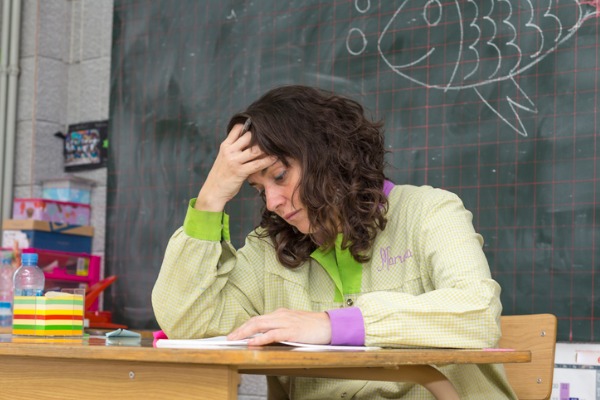Long Covid describes the effects of Covid-19 that continue for weeks or months. Elizabeth Holmes explores how to reduce transmission in classrooms and help staff suffering from the condition.

Long Covid, or Post-Covid condition or syndrome, is devastatingly impacting those who suffer from it physically, mentally, and socially. Covid-19 still infects significant numbers of people each day, causing illness and killing people.
According to recent figures released by the Office for National Statistics, more than two million people in the UK have long Covid at least one year after first being infected.
Of those two million people, the symptoms of long Covid adversely affect the day-to-day activities of one and a half million people. With 342,000 people reporting that their ability to undertake daily activities had been 'limited a lot,' we have a substantial problem on our hands, not least in our schools, which carry a heavy burden of Covid-19 infection.
There are many symptoms associated with long Covid, but the most common symptom reported is fatigue (69%), followed by difficulty concentrating (45%), shortness of breath (42%, and muscle ache (40%).
While we don’t know why some people are affected for the long term, long Covid seems to be most reported in the 35–69-year-old age group, in females (an issue highly relevant to the teaching profession), and those living in more deprived areas (among others).
The figures for people suffering from Post-Covid Syndrome or long Covid are significant. This is not something that impacts an insignificant number of people. These are big numbers amounting to tremendous human suffering.
Keep windows open and no complaining about having the heating on and windows open.
Prevention of Covid in schools varies. While some operate knowing that Covid is airborne and work hard to ensure the building is well-ventilated, even installing air filters in each classroom, others still need to prioritise the prevention of transmission of Sars-Cov-2 (the virus that leads to Covid).
This leads some teachers to describe their classrooms as 'covid soup.' This has led to frustration and despair among those seeking to avoid the possibility of long-term harm from Sars-Cov-2 infection.
Post-exertional malaise (PEM) is a particularly challenging aspect of long Covid. Typical features of PEM include:
RE and Spirituality Officer for Coventry Diocesan Board of Education, and RE Facilitator one day a week for Coventry LA & Warwickshire LA, Jennifer Jenkins, is experiencing long Covid. Her story is not unique, but we must listen to it.
'Long Covid isn’t just about the physical limitations. It is also about the emotional, mental, and psychological impact.
It’s the identity crisis you must navigate because you aren’t the person you were. It’s managing guilt when you say no to friends who ask you to come out because you are too wiped out for socialising. Or the embarrassment when you are in a meeting, and that word you have known your whole life disappears, and you cannot finish your sentence.
Long Covid is learning to plan and pace, so you don’t spend every weekend in bed because everyday work takes the whole week’s energy.
Long Covid is having appointments with health care professionals, each trying to fix one part of the puzzle because there’s no such thing as a long Covid consultant, even two years into the pandemic.
Long Covid is being invisible. It’s ‘You LOOK fine, go to bed earlier.’ It’s teaching me things I never asked about. It’s challenging, but I am doing what I should have done years ago. Simplifying, doing less, and saying no.'
Our best protection against long Covid is to avoid getting infected in the first place. This means that classrooms in schools should be safe places to breathe for children and their teachers.
Covid is an airborne virus, and the air that those in classrooms breathe needs to be clean and Covid-free. Ventilation will help – always keeping windows open and no complaining about having the heating on and windows open. Especially if, as a school, you are not providing air filters for busy indoor spaces.
Wear appropriate clothing if necessary but do not reduce ventilation. Masks will help too, especially if there is an outbreak at school.
Staff with long Covid will need to be able to pace their days and weeks.
How effectively are you currently preventing the transmission of Covid in your school? Are your classrooms well-ventilated? Do you have air filters in busy indoor spaces? Are parents clear about avoiding the spread of Covid by not sending infected (or symptomatic) children into school? Are you encouraging regular testing?
Long Covid exists, is researched and documented, and many school staff are affected by it. Some people have already been through traumatic times, so leadership teams must be knowledgeable and accepting of long Covid.
Staff with long Covid will need to be able to pace their days and weeks. Supporting staff in their work will be essential,the alternative could be losing staff because the job is incompatible with their new energy levels. Staff may need flexibility for tasks such as playground duty or extra-curricular activities. Enabling staff to focus on the essential basics may be enough to support them back to full health while they work.
Be mindful of the emotional toll of long Covid. Staff need to come to terms with losing their former selves.
Offer staff the chance to do as much at home as possible. Do all meetings need to be in person, or can some be online? Do all staff need to be on-site when not teaching? Can long Covid sufferers be offered whole or half days to work at home? Strategies like this might prevent long Covid sufferers from leaving the profession altogether.
Support is available if you have concerns about new Covid symptoms or ongoing Covid symptoms. The sources below may help.